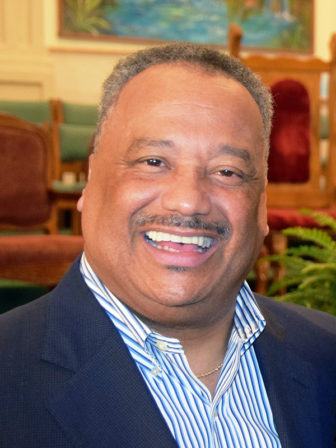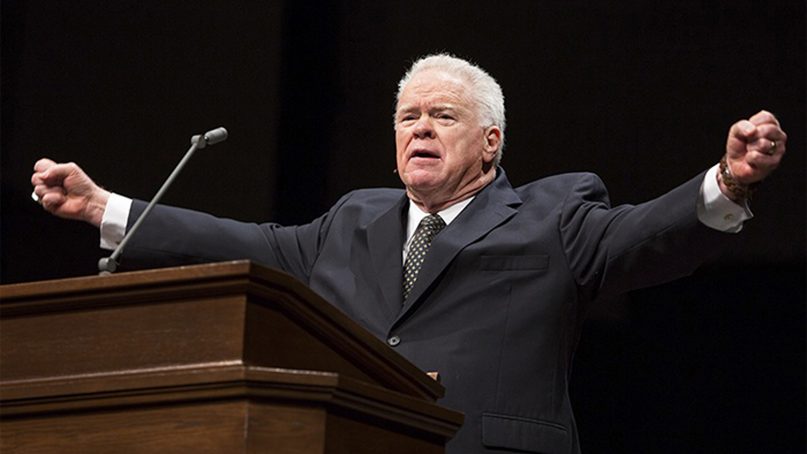(RNS) — A newly discovered letter from one former prominent leader of the Southern Baptist Convention to another reveals a depth of mistrust and suspicion toward the denomination’s first black president.
Shortly after the convention’s 2012 meeting, Paige Patterson, then a seminary president and the architect of the denomination’s conservative turn, sent a letter to another denominational leader expressing doubt about the newly elected SBC president, Fred Luter, who is African American. Specifically, Patterson feared Luter would fail to nominate future leaders of denominational boards and agencies who would continue the conservative resurgence in the nation’s largest Protestant denomination.
“The difficulty is that among many of the ethnic groups there are not so many of them who understand the issues involved and the seriousness of them,” wrote Patterson to Jimmy Draper, a former SBC president. Patterson, a revered figure in the SBC, was fired last year as president of Southwestern Baptist Theological Seminary for mishandling student reports of sexual abuse.
In his letter to Draper, Patterson says he wrote Luter after his historic election to tell him that his appointees must uphold biblical inerrancy — the belief that the Bible is without error — and must also be committed to the appointment of others with like beliefs.
RELATED: Southern Baptist church: Racial prejudice a factor in rejection of black pastor
Though Patterson said he was “glad we elected a black president and specifically Fred,” he sounded a warning: “Under Fred’s leadership it would be possible for us to slide a long way back toward where we once were, and that would be devastating.” This, he said, left him “quaking about it a bit.”
The letter is among a trove of papers given to Southwestern by Draper upon his retirement. It was discovered by SBC layman and blogger Benjamin Cole, who is writing a book about evangelicals and public life. He posted it to Twitter Wednesday (Nov. 13).
https://twitter.com/baptistblogger/status/1194445351324987393?s=12
“I believe the existence of this letter substantiates the concerns of many pastors and churches that qualified godly leaders from nonwhite ethnic backgrounds have never quite received a fair chance to rise to positions of leadership,” Cole told RNS.

The Rev. Fred Luter in 2015. Photo by Richard David Ramsey/Creative Commons
Luter and Patterson did not immediately respond to requests for comment.
R. Albert Mohler Jr., president of the flagship Southern Baptist Theological Seminary in Louisville, Kentucky, and a candidate for the denomination’s presidency, said the letter was regrettable but not shocking.
“Fred Luter made very good appointments and served nobly as president of the Southern Baptist Convention,” Mohler said. “And the fact is that Fred Luter has been supportive in every way of the conservative resurgence in the SBC and so the concerns reflected in this letter were not realized in his appointments.”
The Rev. Dwight McKissic, an African American leader within the predominantly white 14.8-million member group, tweeted that Patterson’s letter was racist and said in an interview that it validates McKissic’s feeling like “the other” within the denomination.
“With the kind of mentality that Paige Patterson expressed in that letter and with the SBC over and over rejecting ethnic minorities for leadership — entity head positions — it leaves you feeling like the other,” said McKissic, a Texas minister whose proposed resolution about white supremacy was eventually adopted after much struggle at the Southern Baptists’ 2017 annual meeting.
“When you have to fight so hard to get an alt-right resolution passed, it just gives you that feeling you’re on somebody else’s territory although you belong to this group.”
The discovery of the letter comes at a time when the denomination formed in 1845 as a haven for Southern slaveholders has been working to reckon with its past — not always successfully. Southern Seminary last year issued a 71-page report acknowledging decades of bigotry, directed first at African slaves and later at African Americans.
But the denomination has also stumbled.
The same year that the resolution denouncing “alt-right white supremacy” passed after a fierce backlash from social media, a group of white professors from Southwestern posed for a photo as rappers, a stunt many saw as degrading and offensive to blacks. More recently, a black pastor who was a finalist for a post at a prominent Florida congregation failed to get enough votes after a racially tinged whisper campaign by church members.

Jemar Tisby. Photo courtesy of Acorn Studio
Jemar Tisby, author of “The Color of Compromise: The Truth about the American Church’s Complicity in Racism,” said Patterson’s letter can’t be dismissed as “one man’s close-minded opinion.” Instead, he said, it represents sentiments held broadly in white evangelicalism in general and among some Southern Baptists in particular.
“The assumption of many white evangelicals is that Black people and other people of color do not have the theological acumen of white Christians,” said Tisby. “The core of the matter is that people such as Paige Patterson and those who share his views functionally believe that only white Christians can be trusted to interpret the Bible and lead the Church.”
Mohler acknowledged that adherence to the Bible is not limited to one group of people.
“I am firmly convinced that biblical orthodoxy and theological fidelity has no race or color,” he said in an interview Wednesday. “Some of the great giants of the faith past and present and future have been those who certainly did not have white skin. And that was true from the very first century of Christianity to the present.”
Mohler said that while concern grew about biblical inerrancy among evangelicals as more liberal Protestants voiced different views in the 20th century, “at the same time you have had powerful affirmations of the truthfulness of God’s word thundering from African American pulpits and from others.”
The conservative resurgence was “primarily a theological correction within an overwhelmingly white denomination” that now is “committed to being less white and more representative of the kingdom of Christ.”
Draper, the man to whom Patterson’s letter was addressed, said the ruckus over it was misplaced and “we’ve got some great ethnic leaders who are in key positions now and have done a great job.”
But he agreed with Patterson’s contention that some minority leaders might not be acquainted with aspects of the conservative-moderate fight that captivated Southern Baptists starting in 1979.
“Most of the ethnics were relatively new to Southern Baptist life,” he said in an interview Wednesday, “and would not necessarily be familiar with other individuals who could help us continue in the effort to be sure we were steered in a conservative theological way. So the letter didn’t pose any kind of criticism of Fred. It just said this may be one of his challenges, knowing people that he could nominate and you might be able to help.”
RELATED: Southern Baptists give greater attention to diversity but acknowledge more needed
Draper also called the idea that the letter demonstrated the notion that only white Christians can be trusted as biblical interpreters and church leaders “ridiculous because there’s no evidence to that at all.” Rather, he said Patterson recognized that the SBC president — then and now — is responsible for dozens of appointments and might want advice.
Draper said he doesn’t recollect Luter ever seeking his counsel on appointments: “I don’t recall him asking me anything.”
According to the 2013 Southern Baptist Convention Annual, this was the racial/ethnic breakdown of 123 committee appointees made by Luter during his first one-year term as president: 13 African American, two Hispanic American, three Asian American, one Native American; the other 104 appointees were Anglo American.





